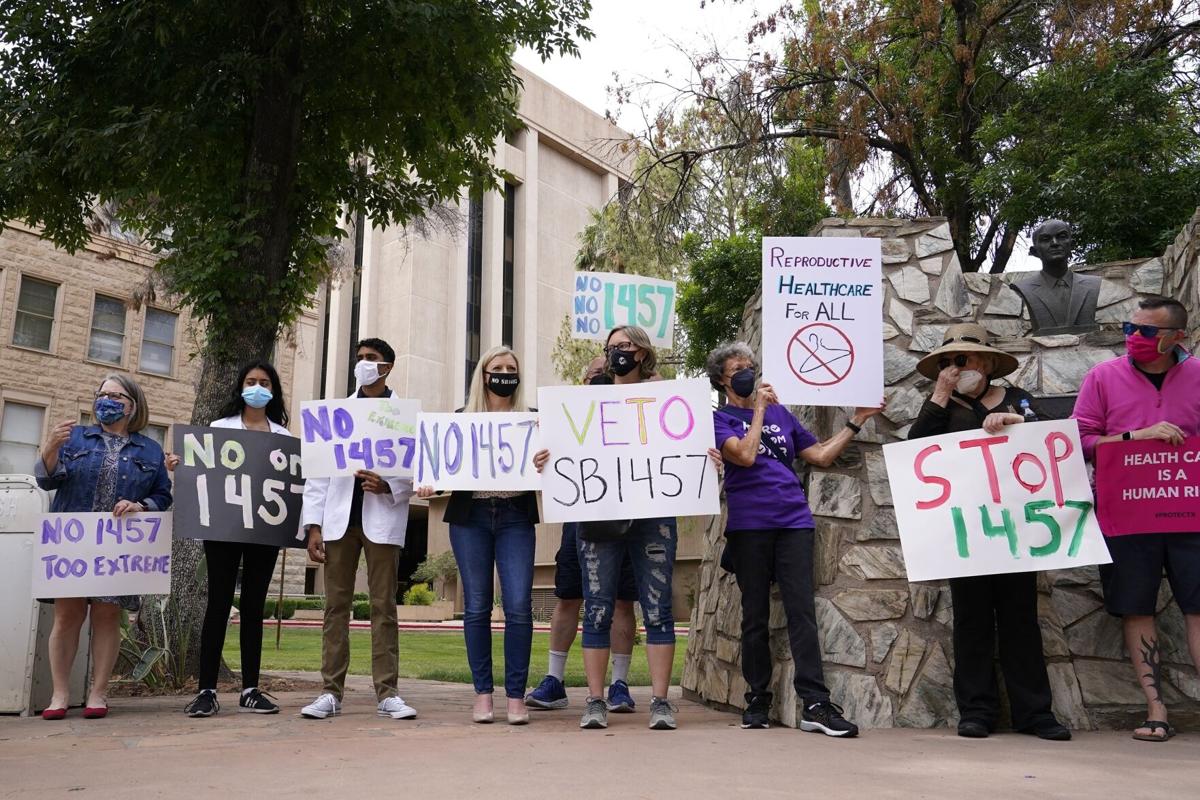Arizona lawmakers gave final approval Thursday to outlawing abortion in virtually all circumstances after 15 weeks.
The party-line vote by the House, with only Republicans in support, came over the objections of Democrats who pointed out that there are no exceptions for cases of rape or incest. And Rep. Kelli Butler, D-Paradise Valley, said it even forbids terminating a pregnancy in cases of fetal defects where it is clear the baby will not survive outside the womb.
Rep. Mitzi Epstein, D-Tempe, also told lawmakers they are fooling themselves if they believe that the measure, which already has been approved by the Senate, will end abortions. All it will do, she said, is result in women, unable to get legal abortions by doctors, attempting unsafe procedures on themselves.
“I’m old enough to remember the coat-hanger days,” Epstein told colleagues.
“It was frightening,” she said. “When women don’t have access to abortion, they can do horrific things because they’re desperate.”
The measure now goes to Gov. Doug Ducey who is expected to sign it.
Ducey has given his approval to every abortion restriction that has reached his desk since taking office in 2015. And the governor even has said that he believes the 1973 U.S. Supreme Court decision in Roe v. Wade that legalized the right of women to terminate a pregnancy was wrongly decided and should be overturned.
It is that possibility of Supreme Court action later this year around which SB 1164 is crafted.
Current court rulings bar states from interceding with a woman’s right to an abortion before the point at which a fetus is viable, generally considered around 22 weeks.
But the nation’s high court is currently deciding the legality of a a Mississippi law imposing a 15-week ban that is identical to what is being proposed here. If Ducey signs the bill and the justices allow that Mississippi law to take effect, SB 1164 automatically would go into force in Arizona.
If the justices overturn Roe v. Wade entirely, however, what’s in this measure could prove moot. That is based on arguments that Arizona’s pre-1973 laws outlawing abortion entirely from the moment of conception, which have never been repealed, would once again be enforceable.
As approved, the measure would make it a felony for a doctor to terminate a pregnancy if the gestational age of the fetus is greater than 15 weeks, with a possible one-year prison term.
The only exception would be for a “medical emergency.” That is limited to any condition where the pregnancy would result in the death of the woman or where there is a “serious risk of substantial and irreversible impairment of a major bodily function.”
A woman who has the procedure, however, is immune from prosecution.
With the votes already lined up, none of the Republican supporters of the measure spoke during the extensive debate. But it took just minutes after the 31-26 roll-call vote for Cathi Herrod, president of the anti-abortion Center for Arizona Policy which crafted the measure, to send out a statement.
“With the governor’s signature, Arizona abortion law will follow the science and better reflect the humanity of preborn life,” she said.
Democratic lawmakers had a different take. Rep. Pamela Powers Hannley, D-Tucson, called it inappropriate government intrusion.
“Parents don’t need or want the government’s help in family planning,” she said. What it also is, Powers Hannley said, is inconsistent with other measures being promoted by the GOP majority.
“We talk about parental choice in education,” she said. “What about parental choice in family planning?”
Rep. Domingo DeGrazia, D-Tucson, focused on the lack of exceptions in cases of rape or incest.
He said lawmakers this session have enacted measures designed to protect victims of crime and raised penalties against offenders, with specific emphasis on sexual abuse. In fact, DeGrazia noted, voters years ago inserted a Victims’ Bill of Rights into the Arizona Constitution, with provisions designed to protect their “due process” rights.
“This bill, however, would prevent victims of rape from deciding for themselves what to do should they become pregnant,” he said, saying it “would deny them the due processes guaranteed in our constitution.”
While no one addressed that issue during Thursday’s House vote, Sen. Nancy Barto, R-Phoenix, the sponsor of SB 1164, said during Senate debate that the manner in which a woman became pregnant is irrelevant.
“The baby inside of a woman is a separate life and needs to be protected,” she said.
Rep. Judy Schweibert, D-Phoenix, told colleagues of the experience of her son and daughter-in-law who had tried for years to get pregnant.
“After the first four months or so, doctors discovered that the fetus was developing without a complete skull or brain,” she said. Schweibert said they chose to terminate the pregnancy after they were told the fetus could continue to live in the womb but would not survive outside.
“Thankfully, there was no state legislator like me or any of you looking over their shoulder to shame, judge, fine or even jail them or their doctors in this heartbreaking situation,” she said.
Rep. Lorenzo Sierra, D-Avondale, said he was voting against the measure because, even as a Catholic, he is “unashamedly pro-choice.”
“I know that people are watching me and probably judging me as I said that,” he said. “But my relationship with God is mine, as it should be with my wife’s and my daughters’, my friends and family who are female, as it should be with their body.”





